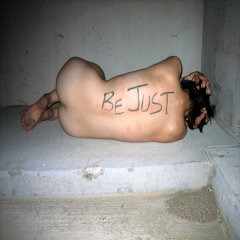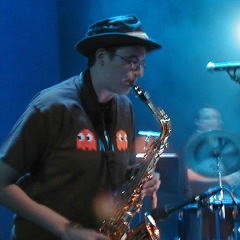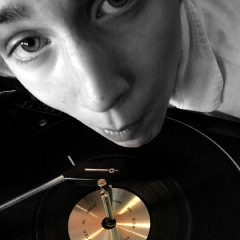Fringe Shorts: Justin Schell
Read on for Fringe coverage from Justin Schell--and check back for regular updates. Schell will cover music-oriented Fringe, and more.




High School Musical: The Vinyl Diary
The Fringe’s (in)famous method of choosing shows (they’re chosen at
random in a lottery) is bound to result in a few stinkers. 3 out of the
4 shows I saw this week were great, which is pretty good for a randomly
selected theater festival.
“The Vinyl Diary,” a musical written,
directed, and performed by students from Eden Prairie High School was,
unfortunately, that stinker.
The show’s story revolves around a group of just-graduated high school
students. One of them, Bradley, discovers an old vinyl record that sets
him on a 3-month journey of self-discovery. In the end, it’s revealed
that the piece of shellac is a record disguised as his future. He thus
learns the true meaning of friendship and the woman who originally gave
him the record, Hope, goes off to enlighten other folks with the saving
power of vinyl.
What upset me about the play was the bland and often
politically regressive nature of the story. Now, I’m not shallow enough
to believe that everything in the suburbs is OK, but this play fulfilled
every stereotype about so-called problems in a suburban high school.
There was one line about “urban blight” that was literally drowned out
by the opening ensemble piece “We’re Free.” There were more
tired and unimaginative jokes about homosexuality than anything relevant
beyond the immediacy of these characters’ very narrow lives.
The fact that it was created completely by high school students is to be
commended, and it’s this fact that can make me overlook a lot of the
youthful unevenness of the show. These students obviously have talent,
and I hope that they choose to exercise and develop their skills on
something more relevant to the larger world in the future.
Ritz Theater
The Embodied Collective: The Penal Colony
Franz Kafka’s short story “The Penal Colony” is not only one of his
greatest stories; it also possesses a tremendous relevance for the
present moment.
The story focuses on an execution machine that, over 12
hours, inscribes the sentence onto the very body of the victim. The
story explores the concomitant questions that arise with execution and
torture, questions of morality and enlightenment, good and evil, justice
and tyranny. The Embodied Collective’s adaptation, “The Penal Colony,”
not only vivified Kafka’s work in bringing it to the stage, but
foregrounded and sharpened many of its strongest thematic points.
Familiarity with the story is a must, however, as the performers (Wade
Haynes, Julia Winkels, and Ryan Dean) did little to make explicit
explanatory connections to either the original story or the current
political situation beyond a framing gesture in the program. The two
primary actors, Haynes and Winkels, take on a variety of the original
story’s roles, while Dean narrates the
action, produces the play’s sound and acts as the
machine’s designer.
In one of the show’s best elements, the group brought the machine itself
to life. Both Haynes and Winkels imitated the repetitive
movements with their bodies, explicitly diminishing the viscerality
normally associated with human movement, while Dean attempted to explain
things from the machine’s point of view. They also foregrounded the
perverse erotics of the needles’ penetration: at one point Winkels thrust herself
on top of Haynes, mimicking the gesture.
In the end, the stage erupts into visual and aural cacophony as the
machine collapses in upon itself to a roar of digital noise. While I
think the group could’ve made it more explicit that the machine destroys
the very system that produced it, the ending of “The Penal Colony” has
to be one of the most intense moments you’ll find at the Fringe this year.
At the Cedar Cultural Center at 416 Cedar Ave. S
Minneapolis, August 8, 7 PM, and August 10, 10 PM.
I Hate Kenny G: Linga Frankly
For many, Kenny G inspires hatred of the most virulent kind. Writer and
musician Allegra Linga takes a different angle to counter her own
visceral repulsion to the smooth sounds of Kenny Gorelick. In her
musical monologue “I Hate Kenny G,” she explores the far-less known
classical saxophone literature, performing pieces by Glazunov and
Milhaud, among others, its title coming from the numerous comparisons
she receives to the much-maligned saxophonist while touring around the
country with Minneapolis-based Buckets and Tap Shoes.
The music, however, is much more a jumping-off point than a focus
for the show. Reminiscent of recent work by Laurie Anderson, the play
mixes music and autobiography, eliciting moments of riotous laughter and
intense sadness.
Linga talks about her own battles with scoliosis and
Graves disease, as well as her mother’s health problems, her battles
with God, and numerous funny stories that come from any musical tour of
the country. Linga possesses a great eye (and ear) for detail, from her
recollections of playing Super Nintendo while her mother suffers a heart
attack, to the importance of dousing seafood in France with lemons (it
kills the creatures before you eat them).
The best moments of the show were also reminiscent of Anderson, in that
a single sentence, even a turn of phrase, can render the entire
monologue into sense in the most unexpected ways. This was most evident
in the section called “Sound of Silence (But Not in a Simon and
Garfunkel Kind of Way), which discusses her own silence during her
mother’s massive heart attack, as well as the paramedics who believed it
was just heartburn and didn’t even turn the siren on. For a life lived
in, through, and around music, these moments of silence were made all
the more shattering.
Presented by Commedia Beauregard at the Playwrights Center,
2301 Franklin Ave E,
Minneapolis, and hosted by the Seward Café. August 8 at 10:00 PM,
August 11 at 7:00 PM,
And August 12 at 1:00 PM.
American Folksongs: The Ballad of Ferris Riley
I went to Intermedia Arts expecting to see the Nonsense Company’s
“American Folksongs: The Ballad of Ferris Riley,” the story of an
obsessive vinyl collector tracing a rare folk single throughout history,
encountering many of the most pressing political issues of the day on
his journey. The Nonsense’s Fringe performance last year, “Great Hymn of
Thanksgiving/Conversation Storm,” was one of the most critically
acclaimed of the entire festival.
However, there were technical problems
for the Madison, WI-based group, as the laptop that held all the sound
cues only felt like showing black.
Not be deterred, Rick Burkhardt and Andy Gricevich gave the audience the
Prince Myshkins, a far-left showcase of skewering musical satire. With
Burkhardt on accordion and Gricevich on guitar, the duo’s highly crafted
songs and wordplay lampooned nearly every facet of contemporary American
political and culture life, from Clear Channel’s list of objectionable
songs (and the Myshkins’ disappointment that they weren’t on it) to a
hilarious fantasy of soldiers “running like rabbits from women in
habits” as a group of nuns shut down the infamous School of the
Americas, the training facility in Fort Benning, Georgia, responsible
for thousands of soldiers now serving in death squads around the world.
There were also moments of intense poignancy, as in “Ministry of Oil,”
where the only untouched building after the bombing of Baghdad is
seamlessly transformed into the only building destroyed by a peaceful
revolution in this country. Indeed, the Bush administration got the best
treatment of all (and deservedly so). Their song “Chickenhawk” featured
a close-harmony, chicken clucking roll call of the entire
administration. And it was a sing along: it somehow felt appropriate
that my first Fringe show should end with the audience coming together
in one of the more unexpected acts of solidarity, gleefully squawking
like chickens.
Tuesday, August 7, at 7:00 PM; Friday, August 10 at 8:30 PM; Saturday, August 11 at 5:30 PM, at Intermedia Arts, 2822 Lyndale Ave S.